Monthly Monitoring Report on China Automotive Intelligent Cockpit Technology and Data Trends (Issue 2, 2024)
Insight into intelligent cockpit: the trend towards large screens is obvious, with >10" center console screens sweeping over 80%.
Based on the 2023 Edition, the 2024 Edition of Monthly Monitoring Report on China Automotive Intelligent Cockpit Technology and Data Trends adds trend forecasts, new car research, OTA tracking and other contents, and further details data indicators. In April, the latest edition of Monthly Monitoring Report on China Automotive Intelligent Cockpit Technology and Data Trends (Issue 2, 2024) was officially released.???
As a core interactive terminal of intelligent cockpits, vehicle display system always draws attention in the industry. In Q1 2024, the market boomed and was characterized by the following:??
01 The trend towards large center console screens is obvious, with >10" screens sweeping more than 80%.
Entering 2024, the trend towards large vehicle displays becomes ever obvious. Center console, as the core interactive entrance of the cockpit, has also become the focus in this trend. According to the data from ResearchInChina, from January to February 2024, large center console color screens were installed in 3.076 million passenger cars in China, a like-on-like jump of 36.1%. Wherein, >10" screens took an 82.8% share, up 10.5 percentage points from the same period last year.??
By size range, the proportion of 10-12 inches grew fastest, up 6.1 percentage points from 33.3% to 39.4 on an annualized basis, mainly driven by the surging installations in AITO M7, BYD Seagull, Corolla Cross and Qin PLUS among others; >15" screens followed, with a share of 12.4%, up 3.1 percentage points, mainly thanks to the surging installations in Li L7, Jetour Traveler, Model Y and other models.?
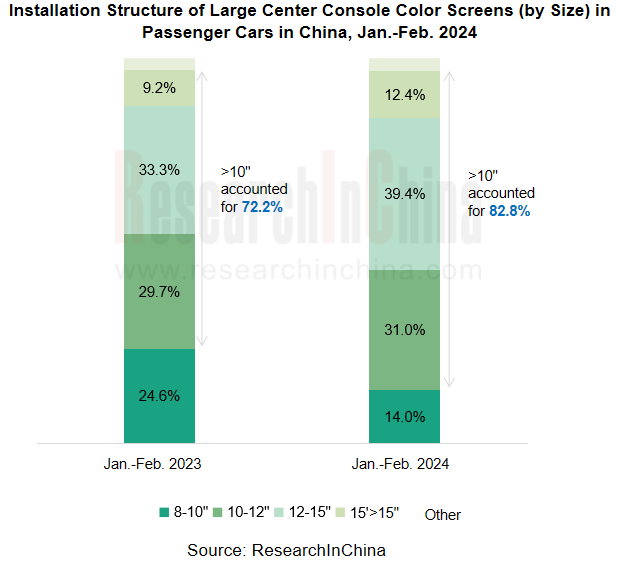 ????
????
In terms of applied models, as of February 2024, >10" large center console color screens have covered 700+ models of nearly 150 auto brands in China. Wherein, >15" screens made up 18% of models of independent brands, and typical models were AITO M7 (15.6 inches), Li L7/L8/L9 (15.7 inches), Deepal S7 (15.6 inches) and Denza D9 (15.6 inches).
In comparison, from January to February 2024, large center console screens took a small share (5.8%) in joint venture brands, and main models applied were Model Y, Model 3, and Ford Mondeo/Explorer.
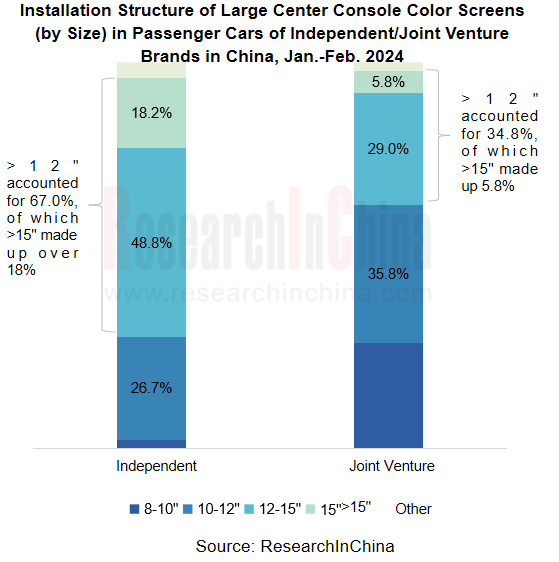
Wherein, integrated displays offer the benefits of super large view, multi-tasking, and synergy/sharing between driver’s and copilot seats, having become the first choice for high-end models. As of February 2024, in China Avatr 12, Jiyue 01 and Galaxy E8 have adopted the "three-in-one" integrated display solution.
In the future, ultra-wide vehicle integrated displays will head in the direction of larger size, higher resolution, multi-function integration, touch and voice control, and personalized settings.
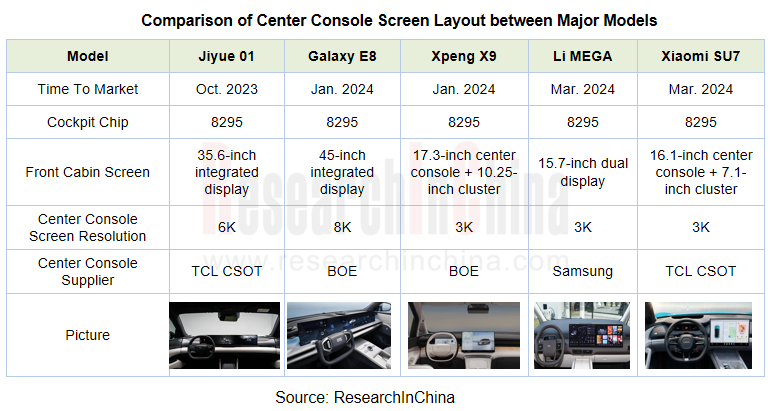
Jointly developed by Geely and Baidu, Jiyue 01 was launched in October 2023. It packs Qualcomm 8295 cockpit chip, deeply integrates Baidu's ERNIE Bot foundation model, Apollo and Baidu Map, and interconnects with Xiaodu Ecosystem.
The cockpit center console is equipped with a 3D boundless integrated display which spans from the driver’s seat to the copilot seat. It enables full screen display, or can be divided into three functional zones as needed: cluster, center console, and copilot seat. It supports interactions such as dragging, zooming, and three-finger operation.
This 35.6-inch display built by TCL CSOT is equipped with Mini-LED display technology, and features a resolution of 6K, a contrast ratio of 700,000:1, and a pixel density of up to 185 PPI, realizing an immersive 3D visual HMI effect.
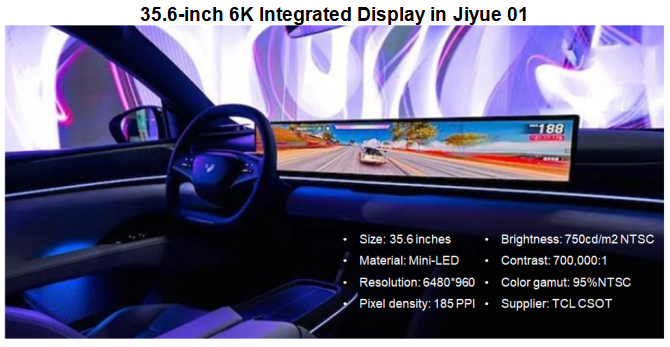
In January 2024, Geely Galaxy E8 was launched, first equipped with a 45-inch large 8K integrated floating display with an overall size of 1157*159mm and an effective display area size of 1130mm*138mm. It integrates cluster, center console screen, and copilot seat screens, and allows for independent split screen operation or full screen display, for example, immersive viewing, and playing games (supporting split-screen two-player battle).
The display is built by BOE Varitronix Limited, with a resolution of 8K and a quasi-retina-level pixel density. Integrating touch and display reduces 10 components to 7 in the conventional design, which not only reduces the weight by 1kg, but also ensures that ultra-thin thickness of 9.8mm meets safety standards and the ultra-narrow black bezel of 7.5mm enables a screen-to-body ratio as high as 98%.??
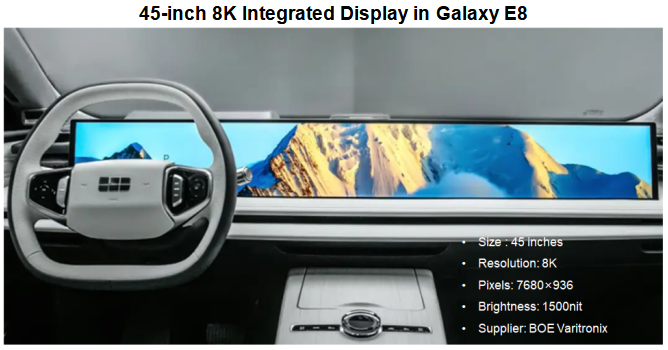 ?
?
In 2023, LG Display supplied 27-inch OLED displays to Hyundai Genesis, and was installed on 2024 GV80. In April 2024, it secured another large LCD display order from an overseas OEM, which was estimated to be a >30" P2P (Pillar to Pillar) display. The production has stared. The mass production is scheduled to start in Q1 2026.
At CES 2024, LG Display announced a 57-inch P2P LCD vehicle display, the world's first display with a size of over 50 inches. Featuring a maximum curvature of 3,500R, the 57-inch P2P LCD provides various driving information, climate controls, and other vehicle information at a glance and allows passengers to enjoy various content, such as movies or games, in high definition with exceptional touch responsiveness thanks to LG Display’s proprietary ‘In-Cell Touch’ technology.???
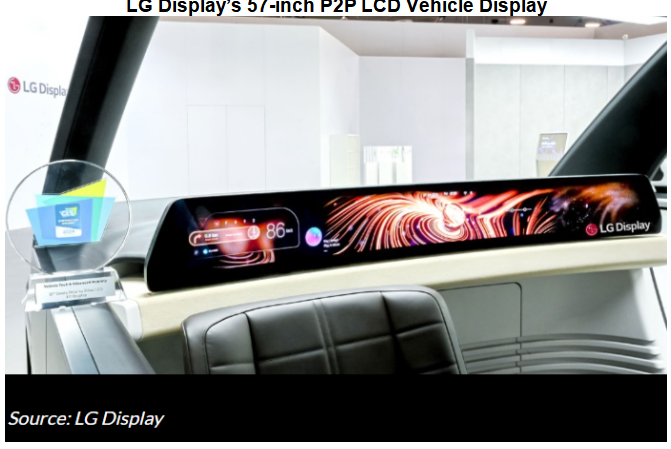 ?
?
02 With n-car entertainment demand increased, and the installation rate of rear entertainment screens boomed sharply.?
With the increasing demand for cockpit entertainment, rear entertainment screens also usher in a boom period. According to the statistics from ResearchInChina, from January to February 2024, rear entertainment screens were installed in 172,000 passenger cars in China, rocketing by 259.1% from the prior-year period.
As seen from the monthly trend, entering 2024, the installation rate (stabilizing at 2%-3% in 2023) of rear entertainment screens enjoyed a spurt, exceeding 5% in both January and February, which was mainly driven by models such as AITO M5, Li L9, Xpeng 9 and new Model 3. Next, more models are expected to carry rear entertainment screens, with the installation rate expected to be over 10% in 2025.?????
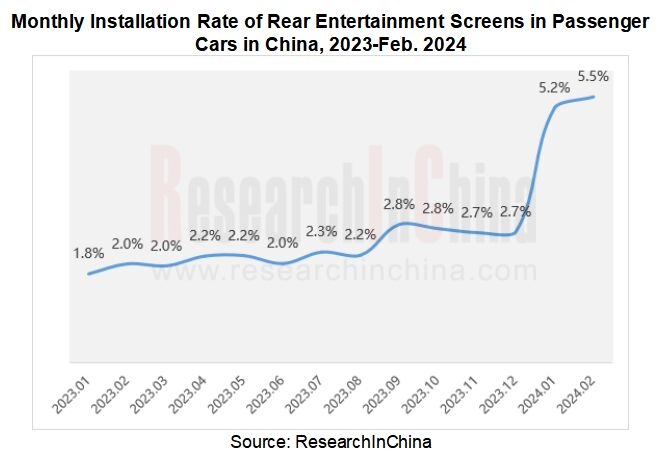
Rear entertainment screens are often installed behind the front seats or behind the center armrest. To meet diversified needs, some manufacturers have built large foldable ceiling screens for rear passengers. With a size even larger than the center console, thy can meet the needs in multiple scenarios such as meeting, rest, and entertainment, and bring much better experience for rear passengers. Typical models include Xpeng 9, Li MEGA, Li L9 and ZEEKR 009.?
Among them, the large rear ceiling screen of Xpeng 9 is 21.4 inches, a size larger than center console + cluster, obviously having become the core interactive screen in the cockpit. The screen supports voice, door panel touch screen, and remote control operations. It enables audio play, gaming, and phone mirroring. It can also be electrically controlled from 0 to 75 degrees, making it easy for users to view even when lying down.?
This screen can also be seamlessly integrated with the front center console screen. Users can operate the functions of the second-row foldable ceiling screen on the front-row center console screen, and vice versa, bringing more convenient interaction experiences.
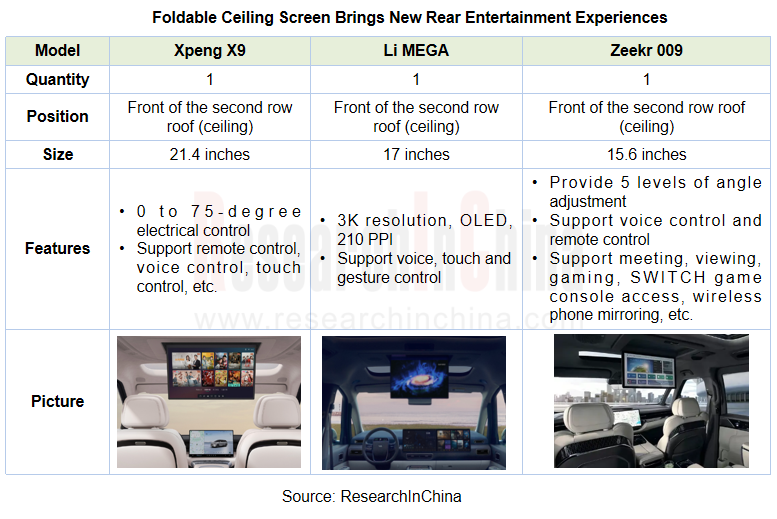
Since 2023, Huawei and Xiaomi, as representatives, have used Pads as rear expandable screens. They can not only be interconnected with the front cabin screen, but also used for vehicle control and taken away after getting off the car. Currently, multiple models have adopted this method to enhance rear entertainment experiences, including AITO M5, Lynk & Co 07 EM-P, Xiaomi SU7 and Luxeed S7.
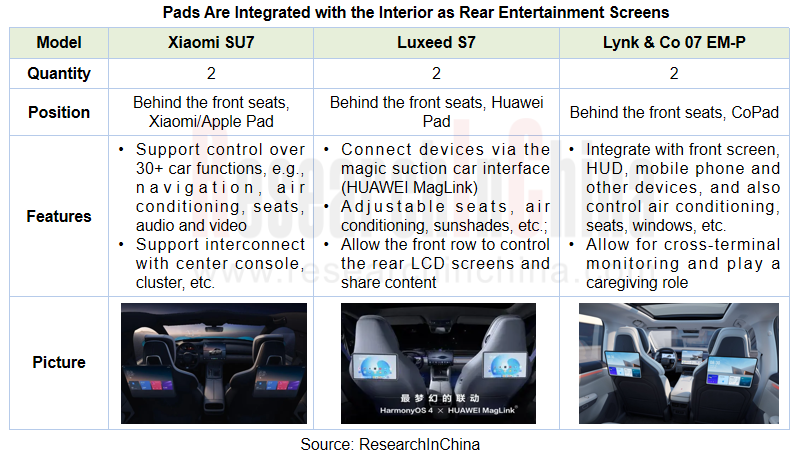
Luxeed S7 bears Huawei MagLink magic suction car interface behind the front seats. It can connect multiple electronic devices like Huawei Pad and can be used once connected, not only for controlling car functions such as seats, air conditioning and sunshades, but integrating with driver’s seat screen and Huawei devices.??
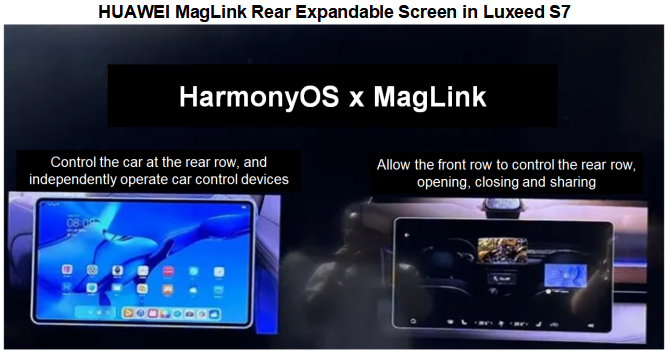
03 Multiple companies deploy Micro LED display technology.
Vehicle display technologies include LCD, OLED, Mini LED and Micro LED. Compared with LCD and OLED, Micro LED has the advantages of high brightness, high resolution, and long service life. It is the next- generation display technology.
From the perspective of application, LCD is the mainstream vehicle technology at present, and OLED and Mini LED are being introduced into vehicles, while Micro LED is in the development phase and has yet to be mass-produced and applied. In 2024, quite a few companies, including Tianma, AU Optronics, Continental, Samsung and BOE, quicken their pace of deploying automotive Micro LED.
Tianma: It is expediting the development of Micro-LED technology and processes, and has made breakthroughs in technical directions such as high PPI, transparency, curved surface, narrow bezel, and adjustable transparency.
In November 2023, Tianma demonstrated a 1.63-inch 403 PPI active Micro-LED display, which features high-definition color and high performance and is applicable to automotive, smart wearable and other fields. Tianma is building a Micro-LED full-process production line with an investment of RMB1.1 billion. The first equipment was introduced in December 2023, and the first sample is expected to be lit in 2024.?
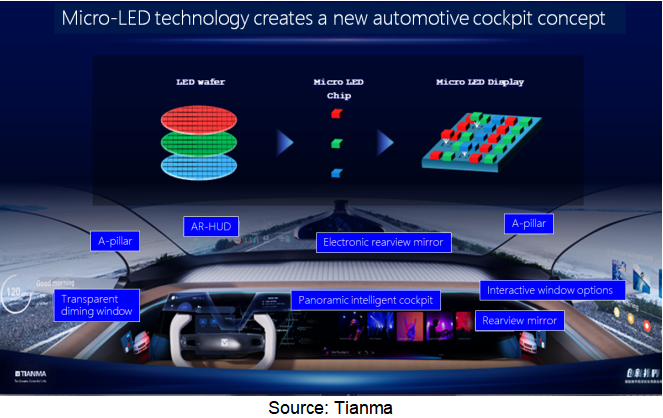
AU Optronics: At CES 2024, AUO demonstrated Interactive Transparent Window, which integrates Micro LED displays into the side windows of vehicles, providing touch functionality for entertainment, online video conferencing, and the exhibition of safety warning information.
In March 2024, AU Optronics announced the completion of its acquisition of German company Behr-Hella Thermocontrol GmbH (BHTC), at an enterprise value of EUR600 million. BHTC has product lines such as vehicle human-machine interface, vehicle air conditioning control system and electronic control components. Its customers include Audi, BMW, Bentley, Volkswagen, Volvo, General Motors, etc. The acquisition of BHTC enabled AUO to successfully become a Tier1 and also speeded up its process in vehicle displays.??
Continental: In March 2024, Continental cooperated with VueReal, a Canadian Micro LED technology developer, to create Micro LED vehicle displays. At CES 2024, Continental and Swarovski Mobility jointly launched the Crystal Center Display based on Micro LED technology.?
It is known that Samsung is considering acquiring Continental’s vehicle display businesses. At CES 2024, Samsung also unveiled a transparent Micro LED display. This cooperation will further push forward the process of developing automotive Micro LED.??
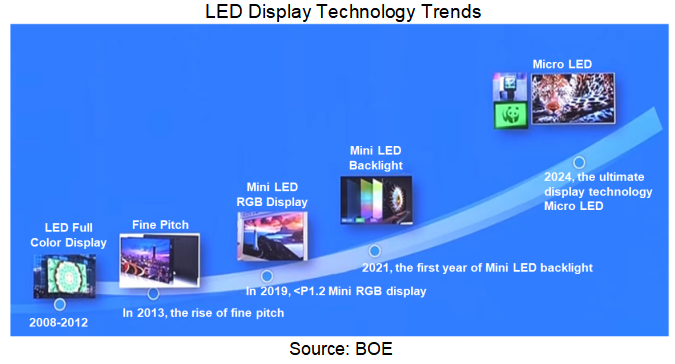
?
Monthly Monitoring Report on China Automotive Intelligent Cockpit Technology and Data Trends has 12 issues a year, and costs US$2,000 per issue, each with different topics.??